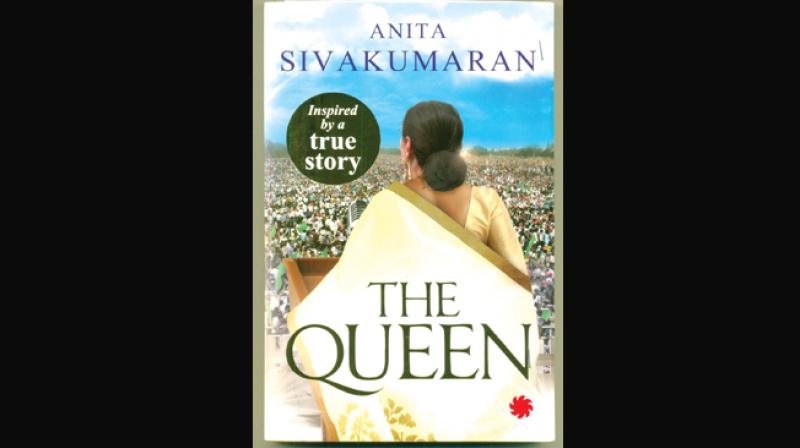Book review: Allegorical strokes on life and times of former Chief Minister
The main characters weaved into this narrative by the author have too obvious referents in recent memory to be termed as purely coincidental'.

Chennai: “Her people. Parliamentary democracy was for intelligent people willing to have coherent debate that led to rational decision-making. But party politics was impossible. Forever at the brink of an election, forever fearful of losing it.
There were the Lok Sabha elections, then the State Assembly elections, all the by-elections and, to top it all, talk of an elected Mayor for the city. She would be campaigning all the time, instead of ruling. Then there was the headache of the Speechwriter’s television channel. She had to do something about that. Oh, but it would be nice to have time to sit in the garden, take a turn, once a day. May be she could do it at five-thirty every day, at sunset. But when she did have a rare evening free, well, she never did, it was Selvi who forced her to…..
There she was. Selvi. She came in and said, ‘I brought my nephew. Will you meet him? He is a great fan.’ Kalai Arasi said, “Sit for a minute. I have been thinking something.”
Selvi sat down. “I don’t know why I have become CM. It was never my ambition to do so.” “You have been working too hard.” “I should be enjoying it, shouldn’t I? If this is what I wanted, I should enjoy everything about it. Instead it feels tedious. Do I care enough about the people? May be someone else should do the job, one who is capable of caring more.”
Selvi laughed. ‘You think the Speechwriter cares about the people? There isn’t a single politician who cares. That is mere fantasy. Gone with the days of the British rule and Gandhi Congress.
You are in it because you were meant for it, and there isn’t anyone who can do a better job, a more selfless job.’ “You really think so?” Kalai felt better. Everyone else was worse than her.
“You are feeling depressed because you have been working too hard.
Come and meet my nephew. He is a sweet boy. Then we will go shopping. It will take your mind off things. You don’t dislike your job. You are just tired.” This telling longish conversational extract is between Kalai Arasi, the actress-turned-politician-Chief Minister, the protagonist of Ms. Anita Sivakumaran’s debut novel, ‘The Queen’, and Ms. Selvi, who is described as a woman who runs a video library in Chennai, and becomes a friend of Kalai Arasi.
She had to fight for every loaf on her way to leading a mighty Dravidian party, after winning the confidence by sheer dint of hard political work and electioneering- her charisma was an enabler-, of her mentor and legendary actor ‘PKB’. All these in parallel unfolds the panorama of the political dynamics of the two Dravidian majors in Tamil Nadu over the last three decades.
The main characters weaved into this narrative by the author have too obvious referents in recent memory to be termed as ‘purely coincidental’. And that is why perhaps Anita Sivakumaran’s book cover adds a caveat: ‘Inspired by a true story’. Anita’s time-horizon swings between 1965 and 2005, the year the young Kalai, egged on by her mother Anju, steps into the world of cinema, to another watermark year of Kalai Arasi in power.
It may read like a piece of political fiction in a contemporary setting, or in more forthright terms, an attempt at an allegory of sorts on the life and times of a recent woman Chief Minister of Tamil Nadu. One may take it as a thinly veiled fictionalized political biography or subtle indictment of contemporary Tamil Nadu politics!
Allegory, in literature, allows writers a certain degree of freedom to mix facts with fiction, even if the combo seems alarmingly real, and gives them a springboard to put forward their moral or political/ideological point of view.
But this narrative runs like a close shave with the recent past, perhaps giving the writer the advantage of re-creating some privileged information about ‘The Queen’ in PKB’s life.
Few liberties the author takes, either by chance or design, even extends to geographical place names in the narrative, as when she identifies Karaikudi as a ‘coastal fishing town’. And we get to know that the train ‘Kovai Express’ between Chennai and Coimbatore has been around since 1965!
Such apparent asides may be put away as trivia, if the woods are not to be missed for the trees. More significantly, as the author says, “Her name, Kalai Arasi, meant ‘she who was ruler of the arts’, but PKB simply called her ‘Arasi’.
To him, she had always been just ‘Queen’.” Whom PKB possibly represents seems too obvious to be even mentioned.
But that is the magic an allegory can do, without having to be necessarily real.
Interestingly, if the name Jayalalithaa is to be de-Sanskritized, would it not be rendered as ‘Kalai Arasi’, even by Tamil University pundits, a reluctant entrant into both the big worlds of cinema and politics, all because she could not pursue her higher studies due to family poverty?
Though the late prodigious musician Dr Balamuralikrishna even dedicated a ‘Raaga’ he created in her memory as, ‘Jaya Jaya Lalithe’, fiction, however brilliantly written, riding piggyback on current history is a very problematic domain.
The woman-protagonist, whose conceptualization is purportedly ‘inspired by a true story’, if true, is already dead and gone in December 2016. The real ‘Kalai Arasi’ did not live to fully tell her own story, though her conversations with
various writers and journalists are there as signposts to understanding a complex woman political leader in recent Tamil Nadu politics. But her sudden death has rendered that exercise inherently incomplete. In all fairness, the benefit of doubt may go to the late lamented J. Jayalalithaa.

